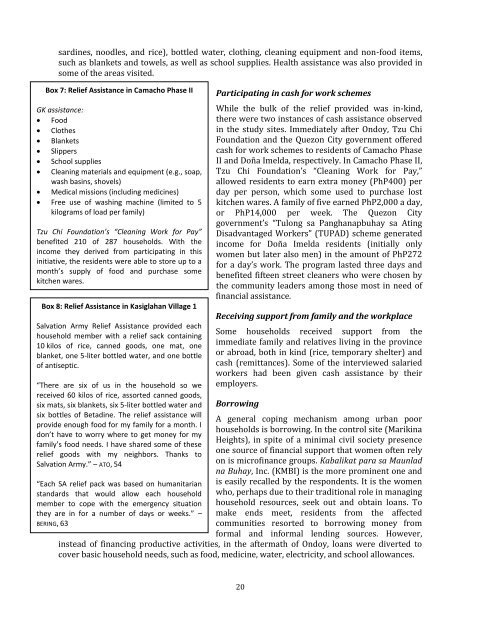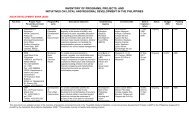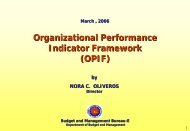rapid assessment of the social impacts of - Philippines Development ...
rapid assessment of the social impacts of - Philippines Development ...
rapid assessment of the social impacts of - Philippines Development ...
You also want an ePaper? Increase the reach of your titles
YUMPU automatically turns print PDFs into web optimized ePapers that Google loves.
sardines, noodles, and rice), bottled water, clothing, cleaning equipment and non-food items,<br />
such as blankets and towels, as well as school supplies. Health assistance was also provided in<br />
some <strong>of</strong> <strong>the</strong> areas visited.<br />
Box 7: Relief Assistance in Camacho Phase II<br />
GK assistance:<br />
Food<br />
Clo<strong>the</strong>s<br />
Blankets<br />
Slippers<br />
School supplies<br />
Cleaning materials and equipment (e.g., soap,<br />
wash basins, shovels)<br />
Medical missions (including medicines)<br />
Free use <strong>of</strong> washing machine (limited to 5<br />
kilograms <strong>of</strong> load per family)<br />
Tzu Chi Foundation’s “Cleaning Work for Pay”<br />
benefited 210 <strong>of</strong> 287 households. With <strong>the</strong><br />
income <strong>the</strong>y derived from participating in this<br />
initiative, <strong>the</strong> residents were able to store up to a<br />
month’s supply <strong>of</strong> food and purchase some<br />
kitchen wares.<br />
Box 8: Relief Assistance in Kasiglahan Village 1<br />
Salvation Army Relief Assistance provided each<br />
household member with a relief sack containing<br />
10 kilos <strong>of</strong> rice, canned goods, one mat, one<br />
blanket, one 5-liter bottled water, and one bottle<br />
<strong>of</strong> antiseptic.<br />
“There are six <strong>of</strong> us in <strong>the</strong> household so we<br />
received 60 kilos <strong>of</strong> rice, assorted canned goods,<br />
six mats, six blankets, six 5-liter bottled water and<br />
six bottles <strong>of</strong> Betadine. The relief assistance will<br />
provide enough food for my family for a month. I<br />
don’t have to worry where to get money for my<br />
family’s food needs. I have shared some <strong>of</strong> <strong>the</strong>se<br />
relief goods with my neighbors. Thanks to<br />
Salvation Army.” – ATO, 54<br />
Participating in cash for work schemes<br />
While <strong>the</strong> bulk <strong>of</strong> <strong>the</strong> relief provided was in-kind,<br />
<strong>the</strong>re were two instances <strong>of</strong> cash assistance observed<br />
in <strong>the</strong> study sites. Immediately after Ondoy, Tzu Chi<br />
Foundation and <strong>the</strong> Quezon City government <strong>of</strong>fered<br />
cash for work schemes to residents <strong>of</strong> Camacho Phase<br />
II and Doña Imelda, respectively. In Camacho Phase II,<br />
Tzu Chi Foundation’s “Cleaning Work for Pay,”<br />
allowed residents to earn extra money (PhP400) per<br />
day per person, which some used to purchase lost<br />
kitchen wares. A family <strong>of</strong> five earned PhP2,000 a day,<br />
or PhP14,000 per week. The Quezon City<br />
government’s “Tulong sa Panghanapbuhay sa Ating<br />
Disadvantaged Workers” (TUPAD) scheme generated<br />
income for Doña Imelda residents (initially only<br />
women but later also men) in <strong>the</strong> amount <strong>of</strong> PhP272<br />
for a day’s work. The program lasted three days and<br />
benefited fifteen street cleaners who were chosen by<br />
<strong>the</strong> community leaders among those most in need <strong>of</strong><br />
financial assistance.<br />
Receiving support from family and <strong>the</strong> workplace<br />
Some households received support from <strong>the</strong><br />
immediate family and relatives living in <strong>the</strong> province<br />
or abroad, both in kind (rice, temporary shelter) and<br />
cash (remittances). Some <strong>of</strong> <strong>the</strong> interviewed salaried<br />
workers had been given cash assistance by <strong>the</strong>ir<br />
employers.<br />
Borrowing<br />
“Each SA relief pack was based on humanitarian<br />
A general coping mechanism among urban poor<br />
households is borrowing. In <strong>the</strong> control site (Marikina<br />
Heights), in spite <strong>of</strong> a minimal civil society presence<br />
one source <strong>of</strong> financial support that women <strong>of</strong>ten rely<br />
on is micr<strong>of</strong>inance groups. Kabalikat para sa Maunlad<br />
na Buhay, Inc. (KMBI) is <strong>the</strong> more prominent one and<br />
is easily recalled by <strong>the</strong> respondents. It is <strong>the</strong> women<br />
standards that would allow each household who, perhaps due to <strong>the</strong>ir traditional role in managing<br />
member to cope with <strong>the</strong> emergency situation household resources, seek out and obtain loans. To<br />
<strong>the</strong>y are in for a number <strong>of</strong> days or weeks.” – make ends meet, residents from <strong>the</strong> affected<br />
BERING, 63<br />
communities resorted to borrowing money from<br />
formal and informal lending sources. However,<br />
instead <strong>of</strong> financing productive activities, in <strong>the</strong> aftermath <strong>of</strong> Ondoy, loans were diverted to<br />
cover basic household needs, such as food, medicine, water, electricity, and school allowances.<br />
20




